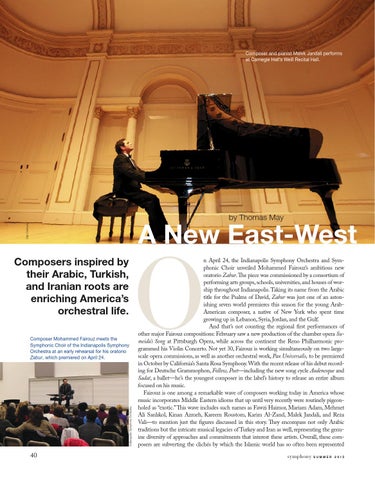Composer and pianist Malek Jandali performs at Carnegie Hall’s Weill Recital Hall.
by Thomas May
Dan Carmody
A New East-West
Composers inspired by their Arabic, Turkish, and Iranian roots are enriching America’s orchestral life.
Indianapolis Symphony Orchestra
Composer Mohammed Fairouz meets the Symphonic Choir of the Indianapolis Symphony Orchestra at an early rehearsal for his oratorio Zabur, which premiered on April 24.
40
O
n April 24, the Indianapolis Symphony Orchestra and Symphonic Choir unveiled Mohammed Fairouz’s ambitious new oratorio Zabur. The piece was commissioned by a consortium of performing arts groups, schools, universities, and houses of worship throughout Indianapolis. Taking its name from the Arabic title for the Psalms of David, Zabur was just one of an astonishing seven world premieres this season for the young ArabAmerican composer, a native of New York who spent time growing up in Lebanon, Syria, Jordan, and the Gulf. And that’s not counting the regional first performances of other major Fairouz compositions: February saw a new production of the chamber opera Sumeida’s Song at Pittsburgh Opera, while across the continent the Reno Philharmonic programmed his Violin Concerto. Not yet 30, Fairouz is working simultaneously on two largescale opera commissions, as well as another orchestral work, Pax Universalis, to be premiered in October by California’s Santa Rosa Symphony. With the recent release of his debut recording for Deutsche Grammophon, Follow, Poet—including the new song cycle Audenesque and Sadat, a ballet—he’s the youngest composer in the label’s history to release an entire album focused on his music. Fairouz is one among a remarkable wave of composers working today in America whose music incorporates Middle Eastern idioms that up until very recently were routinely pigeonholed as “exotic.” This wave includes such names as Fawzi Haimor, Mariam Adam, Mehmet Ali Sanlıkol, Kinan Azmeh, Kareem Roustom, Karim Al-Zand, Malek Jandali, and Reza Vali—to mention just the figures discussed in this story. They encompass not only Arabic traditions but the intricate musical legacies of Turkey and Iran as well, representing the genuine diversity of approaches and commitments that interest these artists. Overall, these composers are subverting the clichés by which the Islamic world has so often been represented symphony
SUMMER 2015
